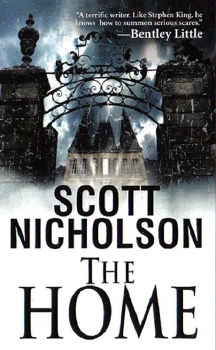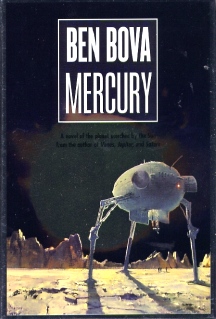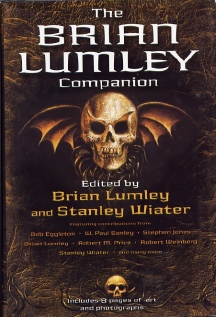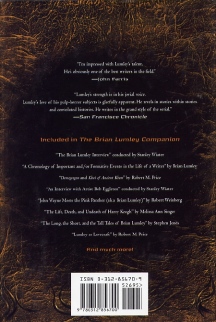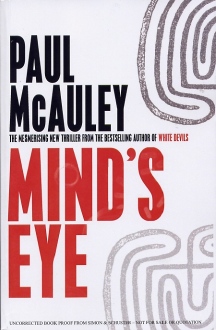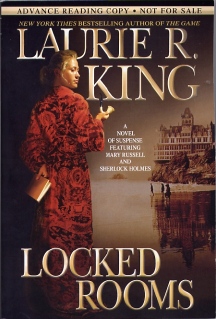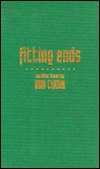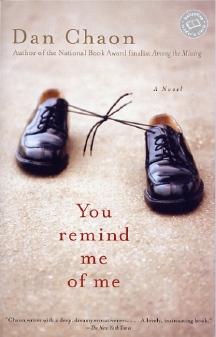|
|
|
This Just In...News from the Agony Column
|
04-29-05: Scott Nicholson is Bringing It All Back to 'The Home' |
|||
Another
Appalachian Gothic Thriller
I can only hope that Nicholson leads a resurgence of regional horror novels. Stephen King staked out his New England / Castle Rock novel stomping grounds in the same environs where Lovecraft once set his. For a while there, Dean R. Koontz had a run down in Orange Country, California. Surprisingly enough, no horror writer set up shop in the America's most fearful rural forest until Nicholson brought us his first novel, 'The Red Church'. Through 'The Harvest' and 'The Manor' he's kept up the attention to local color, and it's given his novels an air of immediacy and a sense of place. But while he keeps the same backdrop, his stories are evolving, and this looks to be his most accomplished and complex work yet. 'The Home' is Wendover, a group home for troubled children. Freeman Mills certainly qualifies. Painful experiments conducted on him during his early childhood left him with the ability to read minds, not a helpful talent when it comes to fitting in amongst your fellow gnarly misfits. But Wendover is not just a group home. Dr. Richard Kracowski, working for a secret society called the Trust, is using electromagnetic fields to study the soul at Wendover. But there's just a tiny problem. He's making it easier for the souls of those who died at Wendover, back when it was a psychiatric ward, to return. These are not happy souls. They have not seen the Light, they are not going towards the Light, they are not interested in any aspect of the Light. This does not bode well for the living resident of Wendover, particularly those who are potentially telepathic. Nicholson seems to be upping the ante and the science-fictional aspect in his latest novel, and I have to say I'm looking forward to it. This is a novel where Bad Things Happen to Good People. The Trust is bringing in the heavy iron, and what theyre setting up in the basement is only the beginning of the bad news. Of course, for readers, conversely, this is good news. Scott Nicholson is back, he's bringing us another bit of the Appalachians, filling in the horrific blanks in an effort to help us lose sleep. Plus, if its a Pinnacle/Kensington paperback, you know, you just know that you'll be able to buy that sucker at the grocery store, or better yet, the liquor store. In the interim, you can visit Scott's website to read the first chapter, read samples of his other books, or take a gander at his journal. Find those twirling racks, readers, this summer. |
|
04-28-05: Ben Bova 'Mercury'; 'The Brian Lumley Companion' |
|||||||||
Grand
Tour from the Un-Grizzled
Here's the problem I foresee. These Bovas have thus far knocked off 'Mercury', 'Venus', 'Jupiter' and 'Saturn'. At this rate, they'll knock off the rest of the solar system by the end of 2006. Unless they know something we don't, of course, about Planet X. Heck, if Bova can clone himself, chances are he could launch Planet X. Talk about a marketing tie-in! I hope he's selling real estate and billboard space. One of the great things about this recent crop of Bova titles is that his methodical approach, one planet after another, provides some guaranteed surprises. Mercury, as we all know is not exactly hospitable. It's not amenable to human exploration. So Bova gets to stretch both his and his clone's imagination as well as the readers' to get his humans on the surface of Mercury. Moreover, with this clone in the works, he gets enough time to add a pretty interesting to me, at least, human element. First off, you've got astrobiologist Victor Molina looking for life. Of course, this would seem ridiculous were we not finding life in the similarly inhospitable undersea volcanic vents on our planet. Then you've got the cheap power contingent. Don't expect solar power beamed from the planet Mercury to offer immediate relief at the pump, however! Yes, we call if the gas pump, but it's really a money pump, and it works in the opposite direction that we assume it to work. And finally, because we're a culture of life, we've got Bishop Elliot Danvers on board this expedition. He's there to make sure that all this darn science doesn't get in the way of fundamentalist teachings. Can you say "Airlock malfunction"? I can! And behind the whole shebang is Mance Bracknell, who once built a one of them thar space elevators that are now so popular in SF novels. [I do believe there will be a series of graduate theses on technological trends in science fiction literature. A few very pale young men will be handed their doctorates for papers tracing the history of this particular technology in the reams of novels currently touting them as the end-all and be-all of space exploration. Wait, where was I?] Said space elevator got blowed up by terrorists (another trendy term to track) with a human-life pricetag in the millions. Makes the cost of our current little skirmishes seem positively economical by comparison. Needless to say (though I'm helplessly compelled to do so), ol' Mance still has a bit of payback on his mind. Come to think of it, from the point of view of any natives to Mercury (even if they are microbes) this space expedition is an invasion. How will we know if bacteria are welcoming us with open what, flagellae? Pseudopods? The real "needless to say" here is that Bova is a Busy Boy. These books by an un-grizzled veteran look pretty damn good even to this grizzled veteran reader. And how fair is it that a guy who was getting published when I was a rack-spinning pre-teen reader at Zody's can remain ungrizzled while popping out three books in less than four months? It ain't one bit fair. It's science. Science Fiction. |
|||||||||
Blurb
Checking
But you know, I can vividly remember buying my first Brian Lumley paperback. It was a US Tor paperback of 'Necroscope!' I was a horror maven at the time, and I loved the garish skull-a-risin' on the cover, and it was -- not coincidentally, mind you -- spinning in a rack in a Playa Del Rey drug store. What's more, I loved the book within as well, and gave it what I thought of as a rave review in OtherRealms magazine. For those who are wondering what the hell I'm talking about, 'Necroscope' was the first in what would become Lumley's wildly popular, uh -- Necroscope series! In it, we meet Harry Keogh who was jivin' with the dead long before that little twerp was pulling the wool over ol' baldy's eyes. 'Necroscope' rocked hard. Keogh got himself drafted by E-Branch, a sort of psychic MI5. There, he had to fight Lumley's wonderfully conceived vampires, which were not the effete cuisinados found in Anne Rice's novels, but bloody damn monsters with a parasite more than a little reminiscent of the then-popular Alien. I loved the book, with its combination of spies, psychics and splatter. I said something along the lines of "This is the biggest, best B movie ever committed to a mass-market paperback." This earned me a rather distraught letter from Mr. Lumley himself, who objected to my comparison of his book to a B-movie. Now, I love B movies and to a certain extent, they've since conquered the world. And I'm still waiting for a mega-budget B movie version of Lumley's novels. There's some talk of that happening, as it were.
This is an incredibly thorough book, absolutely outstanding for anyone who wants to know anything about Brian Lumley's work up till now. You get a couple of interviews. Separate novel, short story and poetry bibliographies. 8 pages of B&W photographs and art. And most importantly, you get A-Z concordances for all of his major novels and series. If you're wondering what a concordance is, it's a like a dictionary of the characters, places, major events, organizations, etc. for each novel. So, should you decide to slip back in to Lumley's grisly (not grizzled) world, well, you wont be lost. Don't know who Gordon Clarke is from 'Necroscope: Avengers'? Look it up! Sure to end up on the shelves of the folks putting together the FICTION OF BRIAN LUMLEY category for Jeopardy! Hell, I just used it, it was easy as...well a dictionary. And I verified that yes, my old paperback edition of Psychamok! is in fact, a first edition. I remember finding those old covers really disturbing in that Monrovia drug store that first sold me Clive Barker and Robert R. McCammon. Shiver!
|
|
04-27-05: Paul McAuley 'Mind's Eye'; A Conversation with Kazuo Ishiguro |
|||
Bad
Signs
By "super-talented British author" I mean in this case, Paul McAuley. I'm giving readers an advance look at a big fall title from UK publisher Simon and Schuster, who last year brought us Ian McDonald's 'River of Gods'. Great people doing quality work. And we already know that Paul McAuley is on our auto-buy list since 'The Secret of Life'. But with 'Whole Wide World' he entered a new phase in his career, leaving behind the deeply weird, deep-space opera of the Confluence novels for slick, imaginative thrillers set in the near future. Last year's 'White Devils' continued this streak, drawing a number of direct comparisons to Michael Crichton. And what the hell -- what's to stop a great novelist from taking aim at a perennial best-selling author whose best work is some thirty years behind him? McAuley's current readers will surely pick up his new novels, but he should also get some attention from other reading sectors that might have heretofore understandably passed him by. For all the popularity of space opera within the genre, it's a flyspeck compared to the numbers that Crichton moves. Now that McAuley's titles can be set up alongside other worthy bestselling science fictions novels -- such as Kazuo Ishiguro's 'Never Let Me Go' -- he's playing in a much bigger pond. All hail. Thirty years ago, Michael Crichton could have written a science fiction novel about a science fiction writer of the 21st century who escapes from the genre to make it big. But here in the 21st century, we can look forward to Paul McAuley's 'Mind's Eye' (Simon and Schuster UK ; September 05, 2005; £12.99). In it, Alfie Flowers sees a bit of graffiti on the (gent's room?) walls of a north London restaurant. The zigzags and whorls cause him to go more than a little berserk as he flashes back on a childhood trauma. But the secret of the graffiti patterns goes back further than Alfie would believe. I'm guessing very far, given that McAuley's research inspirations for the novel include David Lewis-Williams' 'The Mind in the Cave'. There's a CIA-Iraq connection here as well, given the inclusion of Prometheus Books 'The CIA's Black Ops' by the unfortunately-named John Jacob Nutter and 'A Modern History of the Kurds' by David McDowell. A CIA-Iraq connection is not likely to be a happy discovery for Alfie Flowers. Though it is likely a happy discovery for the reader, regardless of your view of recent goings-on Over There. Happy for the reader in that McAuley has a way of mixing up page-turning plots and cutting edge science so persuasively that disbelief is not simply suspended, it's sent on a long summer vacation to enjoy the spot next to you on the beach. So while you're turning your pages, your disbelief can get a bit of rest as well. Save it and use it wisely, you'll want to ensure that you have plenty on hand before the next round of elections, no matter which side of the pond you call home. |
|||
"...the
usual expectations of realism are announced to have been abandoned..."
But the rock biz didn't pan out, and readers are all the better for it. In 1982, he published his first novel, 'A Pale View of the Hills'. He won the Winifred Holtby Prize and has not looked back. His career rocketed into the stratosphere, to the point where he almost regarded the automatic Booker Prize nominations as a joke. His novel 'Remains of the Day' launched the career of a movie production company, and his own efforts are going to be seen on screen later this year, when his original screenplay, 'The White Countess', directed by James Ivory, makes it to the theaters. If you're waiting impatiently, I can heartily recommend 'The Saddest Music in the World'. He wrote the first screenplay for the movie, then handed that over to director Guy Maddin, who made a visionary piece that has at its core a powerful dramatic story. It's unutterably weird, yet the characters and story are powerful and compelling. A movie actually worth your valuable time! But first I'd suggest that you download the MP3 or the RealAudio file of my interview to get a grip on what Ishiguro is all about. He's a fascinating speaker, and I pressed him a bit on the genre aspects of his latest novel. I was pretty shocked, I have to say, at his inspirations. They sure as hell weren't what I'd have expected. But that suggests why he's able to hit the ball out of the park time and again. Avoiding expectations is an excellent authorial career move. And it makes for an entertaining interview. |
|
04-26-05: Laurie R. King 'Locked Rooms' |
|||
Mary
Russell, Sherlock Holmes and San Francisco
Mary Russell was only six years old in 1906 when San Francisco was demolished by an earthquake. But Mary's increasingly troubled sleep and mood as she and Holmes approach the port of San Francisco suggest to Holmes that something much more traumatic than a natural disaster is troubling her psyche. Upon their arrival in San Francisco to settle the inheritance of her family's estate, dodgy behavior by family members and those associated with the estate confirm those suspicions. In a fictional first, Holmes and Russell hire a young crime reporter and detective named Hammet to help them sort things out. King is on the forefront of the current resurgence of Holmesiana. She was there before many of the current crop of Holmes adapters, and she's been there for some time. In fact, shell be appearing in at M for Mystery on May 22, and at the Capitola Book Café on May 23 with Mitch Cullin, author of the literary Holmes pastiche, 'A Slight Trick of the Mind'. King, a fine writer herself, does not go for the literary side of Holmes in her own work. With the Mary Russell novels, she's been offering readers finely detailed adventure stories with an elegant sense of humor and irony rather reminiscent of the work of a certain British author, the first guy to pick up on this Holmes person. With her latest work, she's adding another notch to what is slowly becoming one of the most entertaining alternate histories readers can hope to find. And with the local setting, readers can expect even more delightful dollops of fact to dot the narrative. Readers who cannot wait to start the book can find a sample on her website. Of course, if you go there to visit, do make sure you have some time, since there's a lot of interesting stuff you can find by poking about. She's got a couple of great commentaries, and her blog is also of interest. I have to admit that having met her, I dont see her as the off-road, four-wheel driving type she describes in her blog. But I've been on some of those back roads she describes. Nice place to drive through, yes -- but I might think twice before getting in the Land Rover with her! Of course, the woman who charges through fifteen miles of dirt roads to avoid a gridlocked freeway is precisely the woman to write an Excellent Sherlock Holmes Adventure. Prepare the easy chair and bring out the tea cozy. Sherlock Homes and Mary Russell are arriving in San Francisco forthwith. Seat belts are NOT optional on this ride. |
|
04-25-05: Dan Chaon 'You remind me of me' |
||||||
The Identity Game
'Fitting Ends' was first published in 1995 by Northwestern University, not surprising since Chaon teaches Creative Writing at Oberlin University in Ohio, though he's currently on leave and touring for his novel, now out in trade paperback, 'You remind me of me' (Ballantine Books / Random House ; April 26, 2005 ; $13.95). In his many short stories, Chaon clearly likes to play with the idea of identity, creating characters whom the reader first takes as being one sort of person, only to find out they're rather different. In 'Fitting Ends', "My Sister's Honeymoon: A Videotape", a young is confronted with a sister whose personality has been transformed, and not for the better, by marriage. The title story from 'Among the Missing' regards a man obsessed with a car found at the bottom of a lake with an entire family drowned inside. But it's his parents' marriage that really puzzles him. Knowing one may affect how he knows the other. Chaon made an appearance in the first 'McSweeny's Mammoth Treasury of Thrilling Tales' with 'The Bees', a very creepy story about a man who has abandoned his wife and child and tried to start a new life, create a new identity. Given the venue in which the story appears, all you can say think is "Good luck with that." 'Fitting Ends' has been reprinted by Ballantine, and those first editions are now going for a cool $75.00. His second collection, 'Among the Missing' is available as a first hardcover for a more reasonable price however. And first editions of 'You remind me of me' are going for a song, comparatively speaking. The upshot of this for the seriously book obsessed is that once you read and enjoy the trade paperback edition and decide you need to complete your collection, you'll be able to do so for under a $100, if youre careful.
The literary noir is a form that I suggest will become increasingly prominent. For one, thing, theyre more fun to write. That jagged edge of darkness at the core of these novels gives the writer something meaty to cling on to, and also provides a bit of a plot. But the literary noir is fun to read as well. You enjoy all the thrilling depression of an insightful literary novel with the added bonus of a plot that verges on page turning. And should you require an entrée into the world of literary thrillers, you'd do well to pick up 'You remind me of me'. Just dont expect this book to pick up your mood. Of course, you'll be a rather different person after reading this than you were before. In fact, you're a different person than the person who started reading this article. Look over your shoulder. What, you didn't think your boss read The Agony Column? |
